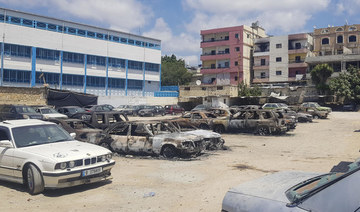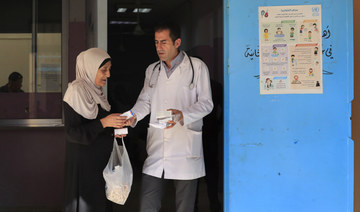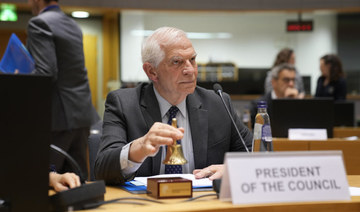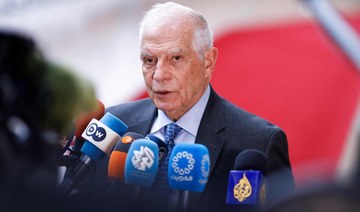BEIRUT: Clashes resumed in Lebanon’s largest Palestinian refugee camp overnight, with heavy gunfire and shelling wounding at least 20 people and prompting residents of the camp and the surrounding area to flee on Friday.
The cease-fire between the Fatah movement in the Ain Al-Hilweh Palestinian refugee camp in southern Lebanon and extremist groups present in adjacent neighborhoods did not hold for more than five weeks.
On Friday, a new round of fighting erupted, and rocket fire hit the city of Sidon, while about 2,500 families from the camp were displaced.
The issue of handing over those involved in the assassination of the Fatah leader Brig. Gen. Abu Ashraf Al-Armoushi in the Ain Al-Hilweh camp late in July to the Lebanese authorities remains unresolved, despite the extremist groups announcing their agreement to it happening.
Among the groups are Jund Al-Sham and Al-Shabab Al-Muslim (Muslim Youth).
The UNRWA school complex in the camp has become a barricade between the warring factions, separated by the common school playground, which now serves as a line of contact.
Extremist groups occupy three schools within their territory in the neighborhoods of Al-Tawarek, Al-Taameer, and Al-Sikkah, while Fatah advanced toward three other schools facing them in the previous round of clashes and remained inside them.
UNRWA had urged the conflicting parties to vacate the schools and suspended operations in the camp as a warning measure.
Leaders in Sidon informed the Palestinian factions that schools cannot accommodate Palestinian students in the upcoming academic year, emphasizing the need for everyone to vacate UNRWA schools to restore normalcy.
A Palestinian security source told Arab News: “Clashes erupted on Wednesday night following news that the Fatah movement had been tasked by the Joint Palestinian Action Committee, comprising all Palestinian factions, including Islamist forces, to apprehend those responsible for the Al-Armoushi assassination.
“In response, extremist groups threw two hand grenades toward a location where Palestinian National Security Forces were stationed. Violent clashes persisted throughout the night, with efforts made by Lebanese and Palestinian leaders to de-escalate the situation. Clashes soon renewed Friday noon.”
Maher Shabaita, secretary of Fatah in Sidon, said: “The meeting of the Joint Palestinian Action Committee emphasized key objectives: preserving the camp’s security and stability, vacating schools occupied by militants, and surrendering the killers to the Lebanese state.
“The clashes were sparked by shots fired at Fatah positions, and Fatah was acting in self defense.”
A rocket landed on the roof of the government building of Sidon Saray, and an office of the General Security, causing minor injuries to a policeman and material damage.
Classes at the Lebanese University in Sidon were suspended, and scheduled exams were postponed to a later date. Measures were implemented in the vicinity of the camp to protect people from stray bullets.
The Palestinian source noted: “Fatah will not back down from its demand to arrest the wanted individuals, especially since it was tasked by the Joint Palestinian Action Committee to do so, and it will not abandon this mission.
“The clashes have broader implications, especially in light of a media campaign by resistance forces in Lebanon, holding Fatah responsible for bombing Sidon and occupying UNRWA schools. This suggests that the clashes aim to weaken Fatah in Lebanon’s largest camps in favor of Hamas and the Islamic Jihad.”
The source added: “Extremist groups are situated in an area considered outside the camp, making it a Lebanese jurisdiction. This matter needs resolution by the Lebanese authorities, especially since this area has become a haven for wanted individuals and fugitives.
“What is essential is the implementation of the plan to station the joint Palestinian security force inside UNRWA schools controlled by extremist group members. If they withdraw, Fatah militants will automatically vacate the schools they occupy.”
Meanwhile, Lebanese political party representatives and leaders engaged in extensive discussions with Palestinian counterparts to broker a new cease-fire. By Friday afternoon, the intensity of the clashes had diminished, with only sporadic gunfire heard.
A prominent Palestinian official told Arab News: “Our current priority is securing a cease-fire, with the implementation of the terms agreed upon by the Joint Palestinian (Action) Committee to be addressed later.”
A source familiar with the situation in Sidon said: “The city’s leaders will not take sides in these clashes but will instead stand against both parties and support the security of the camp and the security of Sidon.”
Displaced Lebanese residents from the vicinity of the Ain Al-Hilweh camp found shelter with their relatives in Sidon and the surrounding area.
UNRWA also opened its complex in the Sibline area, 14 km from Sidon, to accommodate displaced refugees.
Clashes resume between factions in Lebanon’s largest Palestinian refugee camp
https://arab.news/wst4s
Clashes resume between factions in Lebanon’s largest Palestinian refugee camp
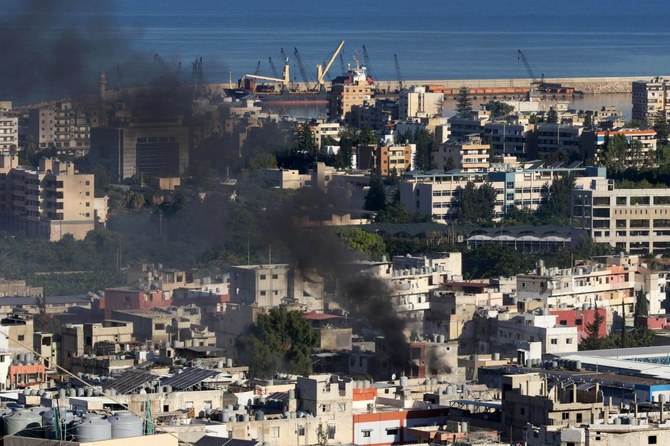
- On Friday, a new round of fighting erupted, and rocket fire hit the city of Sidon, while about 2,500 families from the camp were displaced
- The UNRWA school complex in the camp has become a barricade between the warring factions
Palestinians rally at historic villages in northern Israel

- The descendants of the 160,000 Palestinians who managed to remain in what became Israel presently number about 1.4 million, around 20 percent of Israel’s population
- Israel has killed more than 35,000 Palestinians in Gaza, mostly women and children, according to the health ministry in the Hamas-run territory
SHEFA-AMR: Thousands of people took part Tuesday in an annual march through the ruins of villages that Palestinians were expelled from during the 1948 war that led to Israel’s creation.
Wrapped in keffiyeh scarves and waving Palestinian flags, men and women rallied through the abandoned villages of Al-Kassayer and Al-Husha — many holding signs with the names of dozens of other demolished villages their families were displaced from.
“Your Independence Day is our catastrophe,” reads the rallying slogan for the protest that took place as Israelis celebrated the 76th anniversary of the proclamation of the State of Israel.
The protest this year was taking place against the backdrop of the ongoing war in Gaza, where fighting between Israel and Palestinian militant group Hamas has displaced the majority of the population, according to the United Nations.
Among those marching Tuesday was 88-year-old Abdul Rahman Al-Sabah.
He described how members of the Haganah, a Zionist paramilitary group, forced his family out of Al-Kassayer, near the northern city of Haifa, when he was a child.
They “blew up our village, Al-Kassayer, and the village of Al-Husha so that we would not return to them, and they planted mines,” he said, his eyes glistening with tears.
The family was displaced to the nearby town of Shefa-Amr.
“But we continued (going back), my mother and I, and groups from the village, because it was harvest season, and we wanted to live and eat,” he said.
“We had nothing, and whoever was caught by the Israelis was imprisoned.”
Palestinians remember this as the “Nakba,” or catastrophe, when around 760,000 Palestinians fled or were driven from their homes during the war that led to the creation of Israel.
The descendants of the 160,000 Palestinians who managed to remain in what became Israel presently number about 1.4 million, around 20 percent of Israel’s population.
Many of today’s Arab Israelis remain deeply connected to their historic land.
At Tuesday’s march, one man carried a small sign with “Lubya,” the name of what was once a Palestinian village near Tiberias.
Like many other Palestinian villages, Al-Husha and Al-Kassayer witnessed fierce battles in mid-April 1948, according to historians of the Haganah, among the Jewish armed groups that formed the core of what became the Israeli military.
Today, the kibbutz communities of Osha, Ramat Yohanan and Kfar Hamakabi can be found on parts of land that once housed the two villages.
“During the attack on our village Al-Husha, my father took my mother, and they rode a horse to the city of Shefa-Amr,” said Musa Al-Saghir, 75, whose village had been largely made up of people who immigrated from Algeria in the 1880s.
“When they returned to see the house, the Haganah forces had blown up the village and its houses,” said the activist from a group advocating for the right of return for displaced Arabs.
Naila Awad, 50, from the village of Reineh near Nazareth, explained that the activists were demanding both the return of displaced people to their demolished villages within Israel, as well as the return of the millions of Palestinian refugees living in the West Bank, Gaza and other countries.
“No matter how much you try to break us and arrest us, we will remain on our lands,” she insisted.
Egypt rejects Israel’s denial of role in Gaza aid crisis

- Sameh Shoukry: “Egypt affirms its categorical rejection of the policy of distorting the facts and disavowing responsibility followed by the Israeli side”
CAIRO: Egypt’s foreign minister on Tuesday accused Israel of denying responsibility for the humanitarian crisis in Gaza after his Israeli counterpart said Egypt was not allowing aid into the war-torn territory.
Israeli troops on May 7 said they took control of the Palestinian side of the Rafah crossing to Egypt as part of efforts to root out Hamas militants in the east of Rafah city.
The move defied international opposition and shut one of the main humanitarian entry points into famine-threatened Gaza. Since then, Egypt has refused to coordinate with Israel aid access through the Rafah crossing.
Sameh Shoukry, Egypt’s foreign minister, said in a statement that “Egypt affirms its categorical rejection of the policy of distorting the facts and disavowing responsibility followed by the Israeli side.”
In a tweet on social media platform X, Israeli Foreign Minister Israel Katz had said, “Yesterday, I spoke with UK Foreign Secretary David Cameron and German Foreign Minister Annalena Baerbock about the need to persuade Egypt to reopen the Rafah crossing to allow the continued delivery of international humanitarian aid to Gaza.”
Katz added that “the key to preventing a humanitarian crisis in Gaza is now in the hands of our Egyptian friends.”
Shoukry, whose country has tried to mediate a truce in the Israel-Hamas war, responded that “Israel is solely responsible for the humanitarian catastrophe that the Palestinians are currently facing in the Gaza Strip.”
He added that Israeli control of the Palestinian side of the Rafah border crossing and its military operations exposes “aid workers and truck drivers to imminent dangers,” referencing trucks awaiting entry to Gaza.
This, he said, “is the main reason for the inability to bring aid through the crossing.”
UN chief Antonio Guterres said he is “appalled” by Israel’s military escalation in Rafah, a spokesman said.
Guterres’ spokesman Farhan Haq said “these developments are further impeding humanitarian access and worsening an already dire situation,” while also criticizing Hamas for “firing rockets indiscriminately.”
Since Israeli troops moved into eastern Rafah, the aid crossing point from Egypt remains closed and nearby Kerem Shalom crossing lacks “safe and logistically viable access,” a UN report said late on Monday.
Daesh claims attack on army post in northern Iraq

- Daesh said in a statement on Telegram it had targeted the barracks with machine guns and grenades
BAGHDAD: Daesh claimed responsibility on Tuesday for an attack on Monday targeting an army post in northern Iraq which security sources said had killed a commanding officer and four soldiers.
The attack took place between Diyala and Salahuddin provinces, a rural area that remains a hotbed of activity for militant cells years after Iraq declared final victory over the extremist group in 2017.
Security forces repelled the attack, the defense ministry said on Monday in a statement mourning the loss of a colonel and a number of others from the regiment. The security sources said five others had also been wounded.
Daesh said in a statement on Telegram it had targeted the barracks with machine guns and grenades.
Iraq has seen relative security stability in recent years after the chaos of the 2003-US-led invasion and years of bloody sectarian conflict that followed.
Israeli forces repeatedly target Gaza aid workers, says Human Rights Watch

- They are among more than 250 aid workers who have been killed in Gaza since the war erupted more than seven months ago, according to UN figures
- Israel has killed more than 35,000 Palestinians in Gaza, mostly women and children, according to the health ministry in the Hamas-run territory
JERUSALEM: Human Rights Watch said on Tuesday that Israel had repeatedly targeted known aid worker locations in Gaza, even after their coordinates were provided to Israeli authorities to ensure their protection.
The rights watchdog said that it had identified eight cases where aid convoys and premises were targeted, killing at least 15 people, including two children.
They are among more than 250 aid workers who have been killed in Gaza since the war erupted more than seven months ago, according to UN figures.
In all eight cases, the organizations had provided the coordinates to Israeli authorities, HRW said.
This reveals “fundamental flaws with the so-called deconfliction system, meant to protect aid workers and allow them to safely deliver life-saving humanitarian assistance in Gaza,” it said.
“On one hand, Israel is blocking access to critical lifesaving humanitarian provisions and on the other, attacking convoys that are delivering some of the small amount that they are allowing in,” Belkis Wille, HRW’s associate crisis, conflict and arms director, said in Tuesday’s statement.
HRW highlighted the case of the World Central Kitchen, a US-based charity who saw seven of its aid workers killed by an Israeli strike on their convoy on April 1.
This was not an isolated “mistake,” HRW said, pointing to the other seven cases it had identified where GPS coordinates of aid convoys and premises had been sent to Israeli authorities, only to see them attacked by Israeli forces “without any warning.”
EU top diplomat sees US ‘fatigue’ in Mideast

- Josep Borrell strongly criticized Israel’s war campaign, saying Gazans were ‘dying and starving and suffering in unimaginable proportions’ and that it was a ‘man-made disaster’
- Josep Borrell: ‘I see a certain fatigue from the US side to continue engaging in looking for a solution’
SAN FRANCISCO: The European Union’s top diplomat has said that the United States is showing “fatigue” in its Middle East diplomacy and called for greater EU efforts toward a Palestinian state.
On a visit to California, the bloc’s foreign policy chief Josep Borrell again strongly criticized Israel’s war campaign, saying Gazans were “dying and starving and suffering in unimaginable proportions” and that it was a “man-made disaster.”
“I see a certain fatigue from the US side to continue engaging in looking for a solution,” Borrell said in a speech Monday at Stanford University that was publicly released on Tuesday.
“We are trying to push with the Arab people in order to build together, the Arabs and Europeans, to make this two-state solution a reality,” he said in English.
US Secretary of State Antony Blinken has made seven trips to the Middle East since the unprecedented October 7 attack on Israel by Hamas which prompted a relentless Israeli military campaign in Hamas-ruled Gaza.
He has nudged Israel to allow in more aid, pushed against a regional escalation and pleaded for Israel to accept a two-state solution as part of a broader eventual deal that includes normalization with Saudi Arabia.
But the United States vetoed a Security Council bid to give Palestine full UN membership, arguing that statehood can only come though negotiations that address Israel’s security concerns.
The General Assembly last week passed a symbolic vote for Palestinian membership with the United States one of only nine countries to vote against.
The others opposed included two European Union members — the Czech Republic and Hungary. Among EU heavyweights, France voted in favor and Germany abstained.
Borrell acknowledged that the vote showed the European Union was “very much divided” over Gaza, unlike on the Ukraine war, and cited “historical reasons.”
“But it doesn’t mean that we don’t have to take a stronger part of responsibility because we have delegated (to) the US looking for a solution,” he said.
Borrell, a former Spanish foreign minister, in February sharply criticized the US arms flow for Israel, pointing to President Joe Biden’s own words that too many people were dying in Gaza.
Biden last week for the first time threatened to cut military aid to Israel, with one shipment of bombs already halted, if Israel defies US warnings and assaults the packed city of Rafah.



